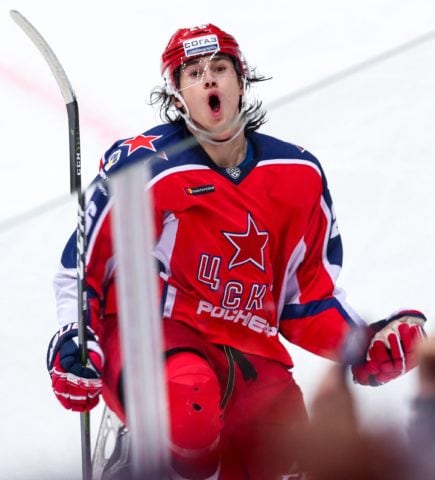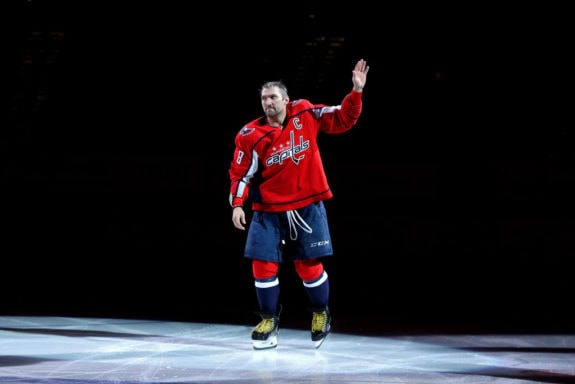The NHL’s Jersey Advertisement Program has lift-off. Starting in 2022-23, the Washington Capitals will wear the logo of Caesars Sportsbook on their home and third jerseys – marking an important shift in the franchise’s relationship with the bookmaker.
“Being woven into the Washington Capitals jersey is an exciting chapter in our collective story,” said Caesars’ Co-President Chris Holdren. “We love blazing trails and we are always looking for innovative opportunities that drive engagement and storytelling for fans. We are proud to extend our historic partnership with such a storied franchise.”
Jim Van Stone, COO of the Capitals’ parent company, called the deal a “wonderful development and exciting fan engagement opportunity for both organizations in the nation’s capital.”
Earlier this year, Caesars launched the United States’ first in-stadium sportsbook at Capital One Arena.
Capitals-Caesars Pen Multi-Year Sweater Sponsorship Deal
In August, it was revealed that the NHL’s board of governors had unanimously voted to approve jersey advertisements for the 2022-23 season. The move gave franchises the greenlight to approach potential commercial partners, with each team permitted to sell a 3-inch by 3.5-inch sponsorship patch on player uniforms.
On Friday, Washington signed the NHL’s first jersey sponsorship deal, penning a multi-year agreement with Caesars Entertainment. The partnership, reportedly worth $5 million per season, will see the bookmaker’s logo appear on the Capitals’ home and third jerseys from 2022-23.
However, the partnership will only cover games played at Capital One Arena due to inconsistencies in gambling legislation across the United States and Canada.
The Capitals will announce an away jersey sponsor at a later date.
The NHL’s Journey To Jersey Adverts
Only six years have passed since NHL Commissioner Gary Bettman proclaimed that he “would have to be dragged kicking and screaming” to introduce jersey sponsorship. “I’m in no rush to put advertising on our sweaters, I like the history and tradition and the way they look,” he said in 2015.
Evidently, a lot has changed since – both within and beyond the NHL.
Although the National Basketball Association’s (NBA) decision to introduce vest sponsorship in 2017-18 increased the pressure on Bettman to act, it was the COVID-19 pandemic that forced the NHL’s change of heart. Resistance to uniform sponsorship inside the league crashed after helmet adverts were introduced last season, mainly because the shift reminded owners of the lucrative opportunities they had previously missed out on.

Moreover, the termination of the NHL’s jersey ad prohibition brings top-flight hockey in line with other major sports in the region.
One of Major League Soccer’s (MLS) 27 franchises, Atlanta United, is reported to earn $3-4 million per season from its sponsorship deal with American Family Insurance. Not only is the Capitals’ agreement with Caesars more lucrative, but the advert patch is also smaller and won’t be placed on all of the team’s uniforms.
In other words, the NHL stands to receive a significant windfall due to authorizing jersey sponsorship. In an era of pandemic austerity, decision-makers were never going to say “no.”
Jersey Sponsorship Remains Unpopular Amongst Fans
While jersey adverts have proven to be popular amongst the NHL’s board of directors, the same cannot be said of the league’s domestic fanbase. There was kickback against the introduction of helmet adverts and resistance to the expansion of uniform sponsorship remains.
The Washington-Caesars deal is an acid test for the NHL. If signing a jersey sponsorship agreement with a sportsbook doesn’t spark a supporter revolt in DC, other franchises will be empowered to act as aggressively. Time will tell.
Ted Leonsis, Gambling, and the Washington Capitals
Capitals owner Ted Leonsis has long spoken about the “gamification” of hockey. He believes that the North American sports industry stands to make significant gains following the liberalization of gambling legislation in the United States.
“I wish we wouldn’t call it gambling,” Leonsis said last year. “To me, gambling is rolling the dice. I have no control over the outcome. Sports betting is informed by data. The more research you do, the more due diligence you do, the more you study, the smarter your bet will be.”
Leonsis’ equation is simple: creating more opportunities to bet on hockey will grow the game’s audience (and prospective profitability).
“Sports and technology are coming together in this new gaming process,” the Capitals owner said. “I think that connectivity and data, as well as all, being activated by real-world community, and then watching these gifted athletes play, is going to continue to grow the sports business.”

Even so, Washington’s latest partnership isn’t just about jersey sponsorship. Monumental Sports & Entertainment (MSE) – the business through which Leonsis’ ventures are operated – allowed Caesars to launch a sportsbook at Capital One Arena in May. The two-story, 18,000 square-foot venue is the first betting facility to open within a US sports facility.
Make no mistake, Leonsis and his Capitals are wholeheartedly committed to gamification. Where that process takes the NHL could be problematic.
Cause For Concern: Sports Gambling In English Soccer
The US Supreme Court struck down a federal law from 1992 that effectively barred sports gambling in most states three years ago. A similar story can be told of Canada, where single-game betting was legalized in August 2021.
The floodgates are open: North American professional sports teams and competitions have the green light to enter partnerships with bookmakers. But should they?
In the United Kingdom, the relationship between sport and gambling has reached worrying heights.
Bolton Wanderers, a club from the third division of English soccer, recently announced that it would not sign any new sponsorship deals with gambling firms. Instead, the team said it will “look at supporting charities and organizations that seek to provide help for those suffering from betting addiction.”
On the topic, chairman Sharon Brittan said: “Latest research shows that there are between 340,000 and 1.4m adult gambling addicts in the UK and over 60,000 young people aged between 11 and 16 are addicted.
“We as an industry must do more and, through our work with Bolton Wanderers in the Community, Bolton Wanderers Football Club will support outreach programmes for those who experience gambling problems.”
However, the English Football League (EFL) – of which Bolton is a member – is sponsored by Sky Bet. The situation is also endemic in the Premier League, where nine of its 20 clubs are sponsored by gambling companies. According to research conducted by the University of Glasgow, there were 716 gambling “exposures” in a recent match between Newcastle United and Wolverhampton Wanderers – an average of six per minute.
Betting adverts are now unavoidable in British sport. By authorizing the Caesars-Capitals jersey sponsorship deal, the NHL risks sleepwalking down the same path.